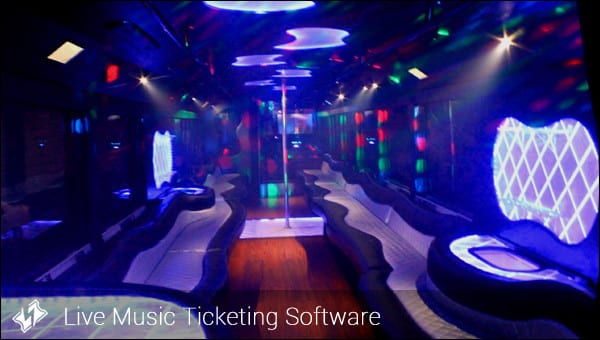
Big budget Las Vegas mega-clubs are well known for providing guests with free rides as a "loss leader" courtesy service . But can event transportation for guests be a revenue generator for your venue?
Event “transportation” can mean many things and is not just limited to traditional limousine service or a so-called “party bus.” A previous post looked at how to increase event parking revenue focusing on two components - the patron’s subjective perception of an event's overall experience, and parking passes as ticket up-sell. But before going into the nuts and bolts of how transportation can make venue owners money, it is important to define a few terms...
"Providing Transportation" vs. "Making Transportation Available"
The mere words “providing transportation” can be a bit off-putting as they conjure up thoughts of high overhead costs, legal liability and unrealistic customer expectations. In Las Vegas, billion dollar casinos and mega-clubs have the budget to provide free transportation for guests, but that is the exception and not the rule.
At the opposite end the the spectrum is the term “making transportation available” which can be as noncommittal as having a flyer for the local taxi service stapled to the exit door. In laid back Austin, Texas, “making transportation available” is be defined as a gaggle of pedicabs parked outside the club’s entrance.
So why take the time to define the terms so carefully? Because it sets expectations in the patron’s mind - and that is critical when making event transportation a revenue generator for your venue.
Depending on the expectation you intend to set, event transportation can be part of the overall ticket revenue stream in the following hypothetical use cases.
Closed Loop Co-Op
The casino and nightclubs in Las Vegas will combine forces and contract a third-party to drive in a set route, stopping at participating venues. Usually the mode is a “party bus” that holds 50 or so people. Contracting a third party to drive the party bus will elevate the venues from worrying about insurance and liability. Guests hop on and off at will, presenting their hotel key or officially issued wristband. Multiple venues sharing resources saves money, and the nature of the route loop, keeps all that sought after disposable income within the confines of the cooperating venues.
Any collection of venue owners could band together and scale the Vegas “loop” method down to a practical size. Where the casinos can afford to have the party bus running non-stop everyday of the week, one may establish just one night of the week, or a big holiday weekend to offer the event transportation option. The venue co-op can each add the party bus as an extra when their patrons are buying tickets on the websites - for outright profit. Or it can be offered for free (wristbands at the door) knowing the closed loop will bring guests only to participating venues, thus increasing bar sales. The closed loop co-op matches the expectation that a venue is "making transportation available" as an option.
Premium Ticket Up-Sell
Looking to Las Vegas once again, there is the pervasive practice of having fleets of limousines available for use by well heeled guests. While there may be far fewer wealthy patrons (referred to as “whales” by the Casinos) the amount of money high-rollers spend, more than justifies the expensive services like limousine event transportation.
Unlike the shared resource of a party bus, event transportation by limousine lends itself to being an ultra premium paid extra. Venues that already have an established premium experience package (bottle service, private balcony seats, etc.) can easily add high-end event transportation as a ticket up-sell, in fact, certain demographics will expect such pampering. Also, many limousine companies prefer to be contracted for the night as it makes them more money. A common practice is for limousine drivers to chauffeur multiple sets of guests to one event - under an “all you can eat” service agreement with the venue - staggering the arrival times slightly. The service is billed to the venue owner, who in turn prices the service at a mark-up. Then the ticketing software displays limousine event transportation as a check-box for an impulse buy establishing the expectation that the venue is "providing transportation."
ThunderTix can help you match your customer's expectations for event transportation - be it part of a pooled resource with other venues or an ultra premium ticket up-sell - using our popular Sell Products with Tickets feature.
To learn more about how ThunderTix can make event transportation a revenue generator, please contact us at your convenience.
Image source: Wiki Commons